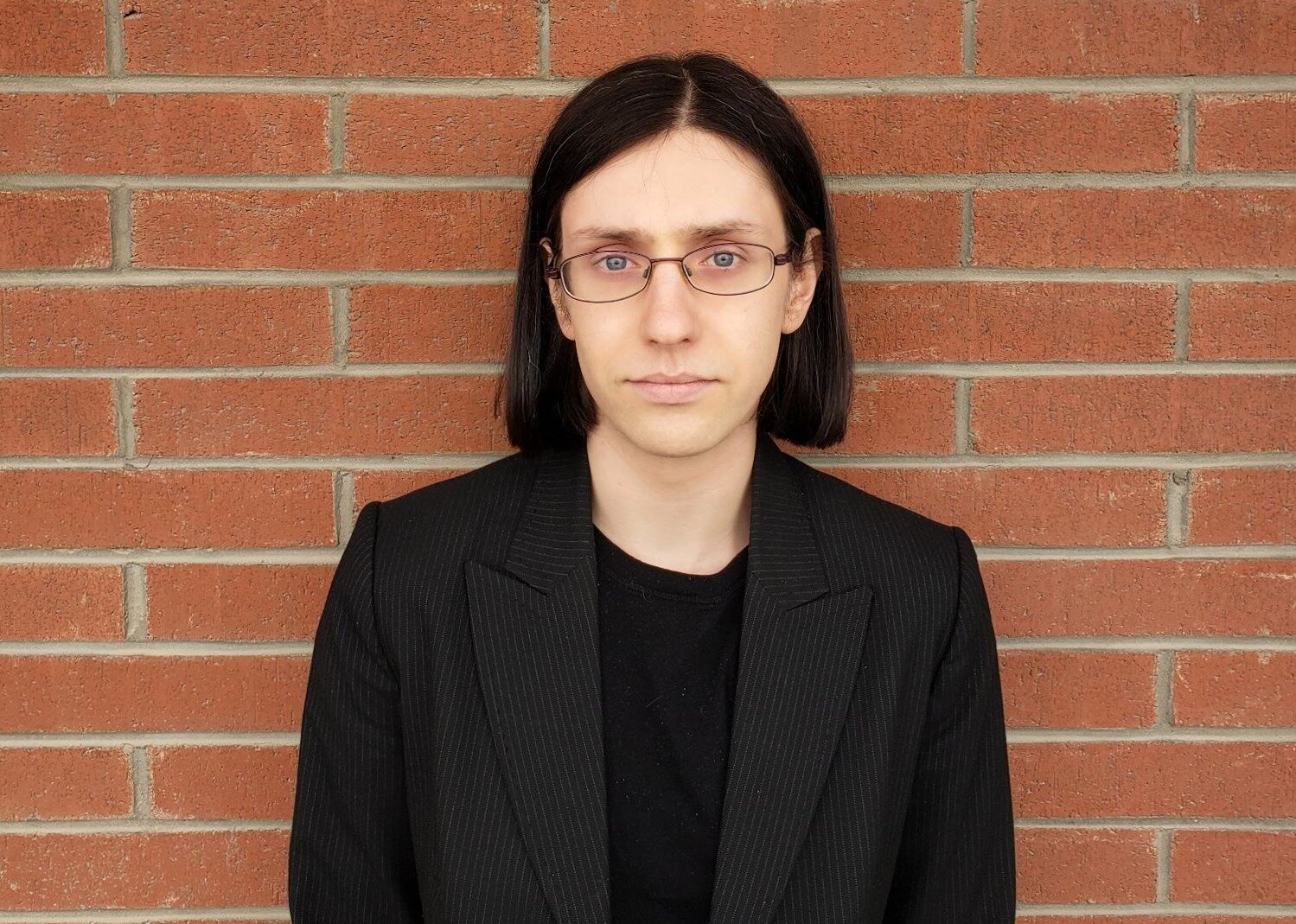In a bookcase in Lyra Evans’s apartment, next to a thick tome on educational law in Ontario, sits a handmade sign emblazoned with the words “Trans Trustee Against Hate.” Evans brought the sign to a counterprotest outside two public schools in Ottawa last October, where hundreds of trans youth and allies stood against B.C.-based anti-trans activist Chris Elston. Elston had been touring across Canada and the U.S. with a sandwich board to protest so-called “gender ideology” and the use of puberty blockers for trans kids.
“I made a sign to show the students and the community that there were LGBTQ2S+ people who were in support of them and their identities, and were willing to stand up to anti-trans rhetoric and bigots,” says Evans. It’s a message that’s particularly resonant amid a growing anti-trans movement that’s making its way into schools and school board elections across Canada and the U.S.
Believed to be the first openly trans school trustee in Canada, Evans is running for reelection in the Ottawa-Carleton District School Board (OCDSB) trustee elections this month. But this time around, the competition is different.
In June, local financial planner Shannon Boschy announced his school board candidacy on Twitter, noting that he’s “running against Canada’s only trans-identified school trustee Lyra Evans.” Two months later, former secondary school teacher Chanel Pfahl tweeted about her campaign in another OCDSB ward, promising “to put student well-being and academic excellence before politics & ideology.”
Boschy and Pfahl both appeared alongside Elston in last October’s school protest. Aside from anti-trans statements, Boschy and Pfahl have tweeted their support for Blueprint for Canada, a shared platform for public school board trustee candidates across the country. The platform features policy positions that reject critical race theory and “gender ideology.”
“The fact that we now have multiple [candidates] running on explicitly anti-trans platforms is troubling,” says Evans. She says she’s spoken with people in B.C. who have noticed a similar trend. Groups such as ParentsVoice BC and the Ontario-based Campaign Life Coalition—many of whom have ties to the far-right—have focused their attention on classrooms, backing anti-trans school board candidates and rallying parent support.
For Evans, the anti-trans movement attempting to take over school boards parallels an increase in anti-trans rhetoric across Canada, the U.S., the U.K. and Australia. She says trans people are presented as a wedge issue, with anti-trans activists frequently accusing trans people of “grooming” and influencing children—a narrative that has long been weaponized against LGBTQ2S+ communities. There have also been concerted online efforts to out and harass not just public figures, but everyday trans people. “It is objectively harder to be openly trans than it was 10 years ago,” says Evans.
At the same time, Evans is hopeful that there’s more public support for LGBTQ2S+ folks than ever before. “One could view this pushback by anti-LGBTQ groups as a recognition that their ideology is dying,” she says. “It’s a last hurrah to try and recapture part of the public, because they recognize that their view is becoming unpopular to the majority of people.”
The school counterprotest last fall served as proof of that, says Evans. “Twenty years ago, if an anti-trans bigot had come to a school, I do not think you would have seen the same outpouring of general community support,” she says. “There were a lot of allies and supporters of LGBTQ2S+ and trans young people—parents who had trans kids, parents whose kids had trans friends, a number of local politicians—who all showed up.”
Evans first decided to run for school board in 2018, after Doug Ford’s Ontario government announced plans to revert to the 1998 sex education curriculum and scrap updates on gender identity and sexual orientation. “I was very upset about that,” says Evans. “I felt like it was undermining the work of the community to educate young people about the existence of LGBTQ2S+ people and foster understanding.” In 2019, the Ford government released a new curriculum that reincorporated discussions about sexual orientation and gender identity.
For over a decade, Evans had worked with local organizations tackling homelessness and LGBTQ2S+ issues. “My activism was born out of a beginning of advocating for myself,” says Evans. “I worked a lot with the organizations that I would have encountered, or that I did encounter as a homeless teenager.” As a trustee, youth empowerment and autonomy are key parts of her approach. “Young people have all the same rights that you or I do,” she says. “ You have to empower them to understand their rights.”
During her tenure, Evans moved a successful motion to end the School Resource Officer Program and remove police officers from schools. She also pushed for the introduction of a more permissive dress code that gives students greater freedom to express themselves, and supported a student-led project to bring free menstrual products to all OCDSB school washrooms.
Trustees have been placed under increased public scrutiny over the past term, says Evans. The pandemic focused attention on school boards, as they made decisions ranging from school closures to mask and vaccination mandates. “No decision the school board could make was going to keep everybody happy,” says Evans. “There is no middle ground.”
The divisive issues meant that parents and community members often took aim at trustees. “We got many angry emails and voice mails,” says Evans. “But there were decisions that had to be made, because you can’t hold public office and sit on your hands.” More than half of the 12 OCDSB trustee incumbents decided not to run again this year, a statistic that some incumbent trustees have connected to vitriol from the public.
Despite receiving hate mail from across North America, Evans says she’s determined to complete the items on her platform over the next four years if reelected. “I think the school board needs to have a more fulsome look at what rights we grant students when,” she says.
Evans says she plans to remain openly trans—regardless of how well she passes—because she rarely saw people like her when she was young. Many trans people of previous generations decided to go stealth and conceal their transness for safety reasons, resulting in a lack of role models for closeted trans youth. “There was no one to look up to, because there were no publicly happy trans people,” says Evans. “Trans people were the punchline in jokes, and that was it.” Meanwhile, the stories we hear about trans people today tend to be solely focused on their transition. Evans is committed to showing that there’s much more to trans people than transitioning narratives.
One of the most impactful interactions she’s experienced as a trustee came in the form of a message over social media from a teenager in Alberta. The teen mentioned seeing an article about Evans becoming the first trans school board trustee in Canada. After sharing the piece with their mother—who responded positively—the teen said they felt safe enough to come out to her. “That has stuck with me, and will probably stick with me until the end of my life,” says Evans. “Those are the kinds of role models I did not have growing up.”
While she’s worried about the growth of the anti-trans movement at the school board level, Evans sees education and empathy as the best ways to combat hate. “[Trans people] are people. They have thoughts and feelings and dreams, just like you do,” she says. “Creating division, attacking them for their identity—it helps no one and it hurts everyone.”


 Why you can trust Xtra
Why you can trust Xtra


